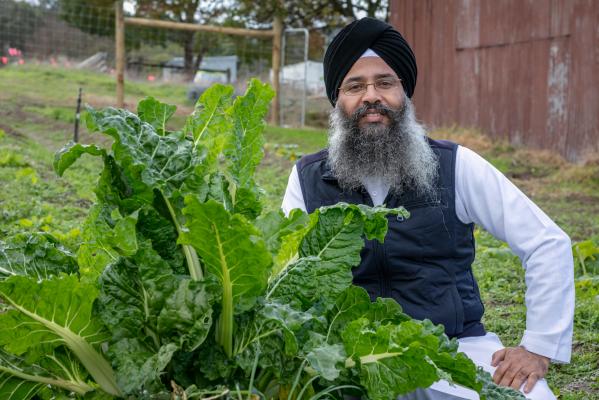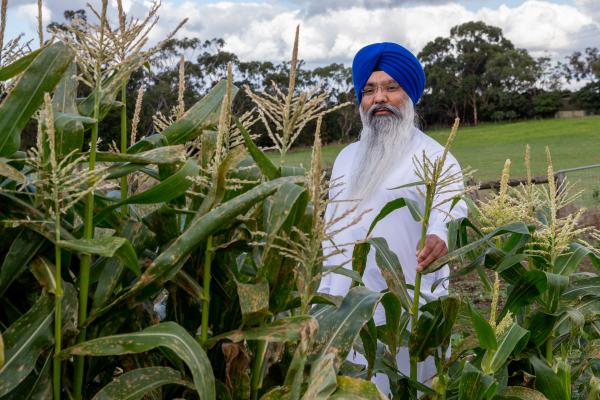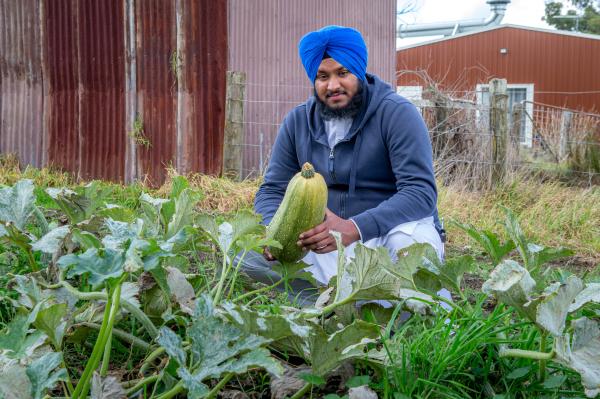Lockdown last year saw many of us head into the garden, building veggie patches and mini-orchards to get us through. But for the Gurdwara Siri Guru Nanak Darbar Officer – the Sikh Temple Officer – getting their green thumbs on was about much more than just passing time, as DANIELLE KUTCHEL discovered.
The Officer Gurdwara went through a verdant transformation during the 2020 Covid lockdowns, as empty space was filled with belly-filling plants and trees.
It was a continuation of work that began three years ago in June 2018 when the Sikh volunteers moved to that spot, according to spokesperson for the temple, Harpreet Kandra.
“One of the core founding principles of the Sikh Temple Officer is to work for the environment,” he explained.
Before the pandemic, around 1200 trees had been planted on the property, which is situated in the pristine bushland at the back of Officer near Haunted Gully Creek.
The area is home to a diverse array of birds and other wildlife, which Harpreet said was another influencing factor in their decision to begin planting; the Sikh faith calls for care to be show to fauna as well as flora.
“The motivation is the core principles of the Sikh faith to, as human beings, not only think about ourselves but nature as well,” he said.
Staff also installed four big bird feeder boxes to increase the biodiversity in the naturally abundant corridor.
It’s particularly relevant as the world marks World Environment Day on Saturday 5 June – a sentiment that is celebrated everyday at the temple.
Noteworthy is that the Sikh temple also has solar panels, water and energy efficient fixtures, composting and engages young kids in its various environmental initiatives.
Of course, the gardening had other practical purposes too.
The process helped the four staff members left at the temple during lockdown, who were experiencing mental trauma, Harpreet said.
Between them they planted 170 trees, including around 70 fruit trees and about 300 square metres of grass on their nature strip.
Planting fruits and vegetables helped contribute to the temple’s other work: providing langar, a free community meal to those who need it.
“Since we provide vegetarian meals to anyone who comes to the Sikh community kitchen, we thought that since we have a big block, why shouldn’t we produce our own food in an organic way and make it part of our kitchen consumption,” Harpreet explained.
The temple started with an empty 650-square-metre block, and embarked on an ambition plan to turn it into an organic farm.
They sought and received funding from Ripe For Change, a grants program delivered by Sustainable Table that promotes organic production of food. Federal funding was also obtained for infrastructure and farming equipment.
The temple also reached out to the Cardinia Food Movement for advice on planting and growing methods, including composting. The Food Network provided advice on things like whether to use seeds or seedlings, where to procure organic manure and how to prepare the soil. Bunnings provided them with free veggie plants to get started, and the planting began.
The Food Movement also encouraged the temple to begin composting its food waste, which will reduce its waste management costs and is something the temple has taken on board already.
A sprinkler crop irrigation system was then installed to keep the trees happily watered.
The temple grounds are home to three water tanks with a storage capacity of 95,000 litres, but Harpreet said there are plans to beef that up to 150,000, including using treated wastewater.
Water management is vital to the production of healthy fruit and vegetables, he said.
“We want to use only rainwater. We’re doing sprinkler irrigation, not flood irrigation.
“When we first planted trees we used some water from South East Water, but currently we’re only using rainwater.”
Throughout the strict lockdown the four staff were kept busy looking after the crops as well as providing emergency groceries for people in need.
The temple provided grocery bags with the basics, but in future is hoping to use its own veggie garden produce in there too.
“We’re still in a learning phase but hope that our productivity will increase, and we’re happy to share with anyone who needs assistance,” Harpreet said.
“We give our grocery kits out along with recipes so recipients can start cooking in the kitchen, which helps with anxiety and depression and makes them more creative and happier. The lady volunteers developed a recipe book who has been shared by wider community and well received.”
As well as producing its own organically grown food, Harpreet said the temple was focused on encouraging its community to start veggie patches in their backyards and develop their own food production skills.
“That contributes to food security,” he explained.
It’s hoped that in future, visitors from India will spread the word on organic farming and water management to relatives and friends there.
Up next, the temple is preparing a blueprint of how it will grow – from building a bigger community hall to creating a multipurpose place for various indoor and outdoor events.
“We want to expand the organic farm further based on the experience we have acquired over the last few months,” Harpreet said.
That will include putting a workshop on the property so the tools required each day are ready on site. Upgrades to the solar panel system will take the Gurdwara off the grid completely, in accordance with the Sikh principle of conserving the environment.
“We are still on a learning curve, gathering information and encouraging our community to come and help us in the organic farm,” Harpreet said.
“Come and learn with us, and learn from us!” he said.
Find the Gurdwara Siri Guru Nanak Darbar Officer on Facebook for more information or visit www.sgnd.com.au









